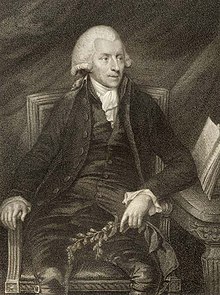William Withering
| William Withering FRS | |
|---|---|
 |
|
| Born | 17 March 1741 Wellington, Shropshire |
| Died | 6 October 1799 (aged 58) Sparkbrook, Birmingham |
| Citizenship | English |
| Nationality | English |
| Fields | Botanist, geologist, chemist, physician |
| Academic advisors | William Cullen |
| Known for | Discovery of digitalis |
| Signature | |
William Withering FRS (17 March 1741 – 6 October 1799) was an English botanist, geologist, chemist, physician and the discoverer of digitalis.
Withering was born in Wellington, Shropshire, trained as a physician and studied medicine at the University of Edinburgh Medical School. He worked at Birmingham General Hospital from 1779. The story is that he noticed a person with dropsy (swelling from congestive heart failure) improve remarkably after taking a traditional herbal remedy; Withering became famous for recognising that the active ingredient in the mixture came from the foxglove plant. The active ingredient is now known as digitalis, after the plant's scientific name. In 1785, Withering published An Account of the Foxglove and some of its Medical Uses, which contained reports on clinical trials and notes on digitalis's effects and toxicity.
Born in Wellington, Shropshire, England, he attended Edinburgh Medical School from 1762 to 1766. In 1767 he started as a consultant at Stafford Royal Infirmary. He married Helena Cookes (an amateur botanical illustrator, and erstwhile patient of his) in 1772; they had three children (the first, Helena was born in 1775 but died a few days later, William was born in 1776, and Charlotte in 1778). In 1775 he was appointed physician to Birmingham General Hospital (at the suggestion of Erasmus Darwin, a physician and founder member of the Lunar Society), but in 1783 he diagnosed himself as having pulmonary tuberculosis and went twice to Portugal hoping the better winter climate would improve his health; it did not. On the way home from his second trip there, the ship he was in was chased by pirates. In 1785 he was elected a Fellow of the prestigious Royal Society and also published his Account of the Foxglove (see below). The following year he leased Edgbaston Hall (now home to a golf club and nature reserve), in Birmingham, England. He was one of the members of the Lunar Society. During the Birmingham riots of 1791 (in which Joseph Priestley's home was demolished) he prepared to flee from Edgbaston Hall, but his staff kept the rioters at bay until the military arrived. In 1799 he decided that he could not tolerate another winter in the cold and draughty Hall, so he bought "The Larches" in the nearby Sparkbrook area; his wife did not feel up to the move and remained at Edgbaston Hall. After moving to The Larches on 28 September, he died on 6 October 1799.
...
Wikipedia
